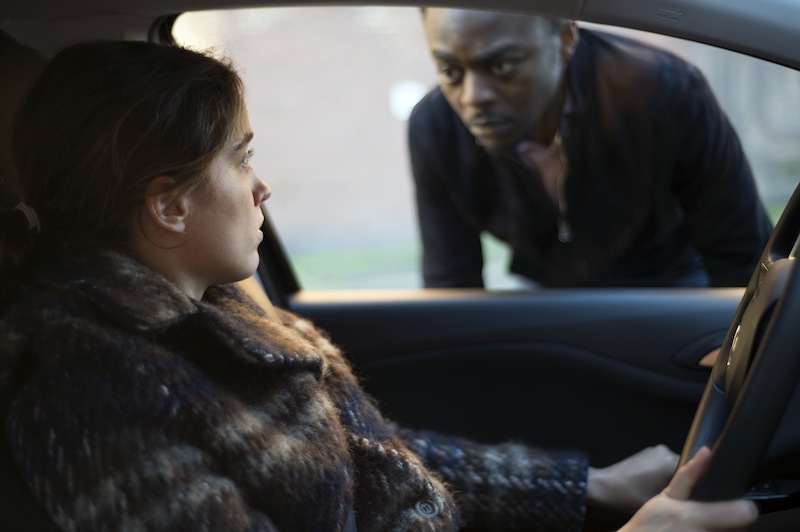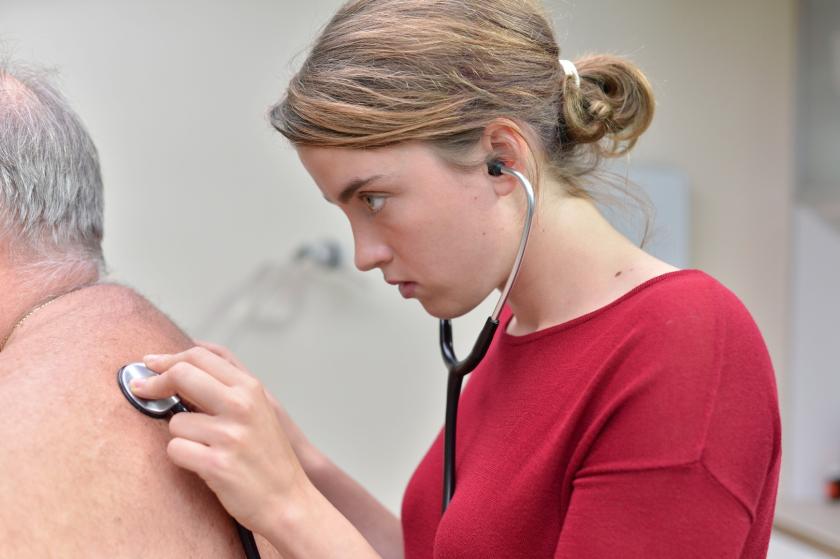The Dardennes brothers' latest tale from the grim streets of the industrial suburb of Liège in Belgium is another quietly powerful masterpiece; it’s perhaps their best film since The Child. Re-edited since it debuted at Cannes to mixed reviews, it fuses elements from social realist cinema, morality play and a whodunit murder mystery. The result is a wholly gripping narrative told with understated eloquence.
The film opens with no introductions: a young woman, stethoscope in ears, is listening to a patient breathe. Beside her is a man wearing a white coat. There’s shouting from outside the room - in the waiting area a little black boy is having a seizure and his mother is distraught. The man in the white coat is paralysed at the sight and does nothing; the young woman (Adèle Haenel) snaps into action. Afterwards she berates the young man (Olivier Bonnaud) and their roles become apparent. She is Dr Jenny Davin, in sole charge of a small practice where most of the patients are on benefits, and he’s Julien a medical student. She tells him, "A good doctor has to control his emotions or you won’t make a proper diagnosis." When the doorbell rings, she tells him sternly not to answer, the evening surgery’s already run an hour later than it should do. Julien storms off, not to return.
The moral dilemmas exposed in the film are worthy of HitchcockThe next day the police turn up; a young African woman with no ID, has been found dead on the bank of the river nearby. Checking the surgery’s exterior CCTV, Dr Davin realises the dead girl was her late-night caller. Adèle Haenel has the most extraordinary facial control: she can subtly convey that lurching sensation when you’re first told bad news, the physical effects of that instant rush of adrenaline. Her eyes flicker, there’s a tiny movement of her mouth as if she’s suppressing the desire to vomit. It’s all done swiftly and subtly and it's mesmerising – for the rest of the film one watches her face, trying to work out what she’s thinking and feeling and how she can survive the world around her. Stricken with guilt about not letting the African girl inside, distressed that no one knows who the victim was and horrified that she’ll be buried in an unmarked, pauper’s grave, Dr Davin embarks on her own quest to find the girl’s murderer and her identity.
 Her amateur detective work uncovers connections between her own local patients and the neighbourhood's population of menacing hustlers and petty criminals (pictured above: Dornael with Marc Zinga playing a pimp). The Unknown Girl is almost a Nordic noir in its feel: its ingredients include bleak city streets, illegal immigrants scraping along, cops who don’t want to share information and a neat twist at the end. There are red herrings in terms of suspects and coincidences, which occasionally strain credibility, but Dr Davin like Saga in The Bridge and Sarah Lund in The Killing, is an engimatic central character. She appears to also be an"‘unknown girl" without a back story, friends or family. She is stern and serious with only brief moments when a smile breaks through as a patient shares food with her or offers a coffee. We see her turn down a more prestigious job to carry on working with her impoverished patients and to trace the murdered girl. She takes to camping in the surgery, wearing the same plaid jacket, encountering personal danger on building sites.
Her amateur detective work uncovers connections between her own local patients and the neighbourhood's population of menacing hustlers and petty criminals (pictured above: Dornael with Marc Zinga playing a pimp). The Unknown Girl is almost a Nordic noir in its feel: its ingredients include bleak city streets, illegal immigrants scraping along, cops who don’t want to share information and a neat twist at the end. There are red herrings in terms of suspects and coincidences, which occasionally strain credibility, but Dr Davin like Saga in The Bridge and Sarah Lund in The Killing, is an engimatic central character. She appears to also be an"‘unknown girl" without a back story, friends or family. She is stern and serious with only brief moments when a smile breaks through as a patient shares food with her or offers a coffee. We see her turn down a more prestigious job to carry on working with her impoverished patients and to trace the murdered girl. She takes to camping in the surgery, wearing the same plaid jacket, encountering personal danger on building sites.
The Dardennes brothers are minimalists using naturalistic lighting and no score - the only soundtrack is industrial noises or the swish of heavy traffic on the ring road outside the surgery. Philosophical questions about our responsibility towards others, particularly those living in poverty, run through the film and are left open-ended. The social realism will be familiar to Dardennes’ fans, but the addition of the detective element brings a new narrative energy to their work. The Unknown Girl confronts moral dilemmas worthy of Hitchcock, in particular difficult questions around the code of doctor-patient confidentiality. There’s a rare excursion to the countryside for a re-encounter with Julien, but otherwise this is a relentless and impressive slice of urban noir.
Overleaf: watch the trailer for The Unknown Girl















Add comment